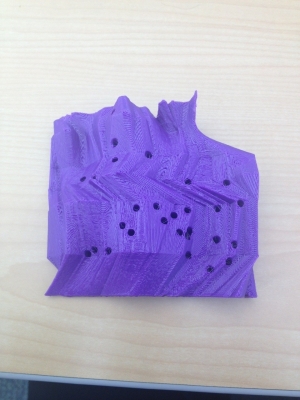SLS has a sophomore-level class called Technology and Sustainable Community Development. I coordinated the first offering in Spring 2016, with a team of diverse intellectual characters -- Sabir Khan (Architecture), Betsy DiSalvo (Interactive Computing), Jennifer Hirsch (SLS and City and Regional Planning), Wayne Li (Industrial Design and Mechanical Engineering) and Dan Matisoff (Public Policy).
We used water as a theme throughout the class. The Flint crisis was the backdrop for the development of glossary terms and concepts to understand what was happening and put it into broader perspective. Students chose terms like “safe level of contamination” and “restitution/compensation/restoration.” Students attended a meeting of the Proctor Creek Stewardship Council to observe and learn from a community organization dedicated to “the ecological health of the Proctor Creek Watershed Basin and the quality of life of all its people.”
 The class culminated with student projects. One team analyzed a year’s worth of 311 data from the City of Atlanta, examining differences in number and type of reports from calls from neighborhoods in the watershed with calls from other neighborhoods. Another student created an on-line instructable for building your own water pollution monitor from an Arduino kit and a disposable pen. And in the photo shown here, two students built a 3D scale topographical model of part of the Westside with holes drilled in the locations of sewers. (Runoff and sewer backups are a big problem during heavy rains.)
The class culminated with student projects. One team analyzed a year’s worth of 311 data from the City of Atlanta, examining differences in number and type of reports from calls from neighborhoods in the watershed with calls from other neighborhoods. Another student created an on-line instructable for building your own water pollution monitor from an Arduino kit and a disposable pen. And in the photo shown here, two students built a 3D scale topographical model of part of the Westside with holes drilled in the locations of sewers. (Runoff and sewer backups are a big problem during heavy rains.)
I love how these projects combine Georgia Tech disciplinary expertise within the new context of communities and water. Collectively, these projects draw on familiar disciplines such as statistics, information visualization, embedded computing and 3D modeling. They also connect to community concerns and advocacy, citizen science, public education and community surveying. None of these projects could be completed without solid Georgia Tech skills combined with an understanding of community-based water issues. To me that is the vision of Serve-Learn-Sustain: building on disciplinary expertise to address sustainable communities.